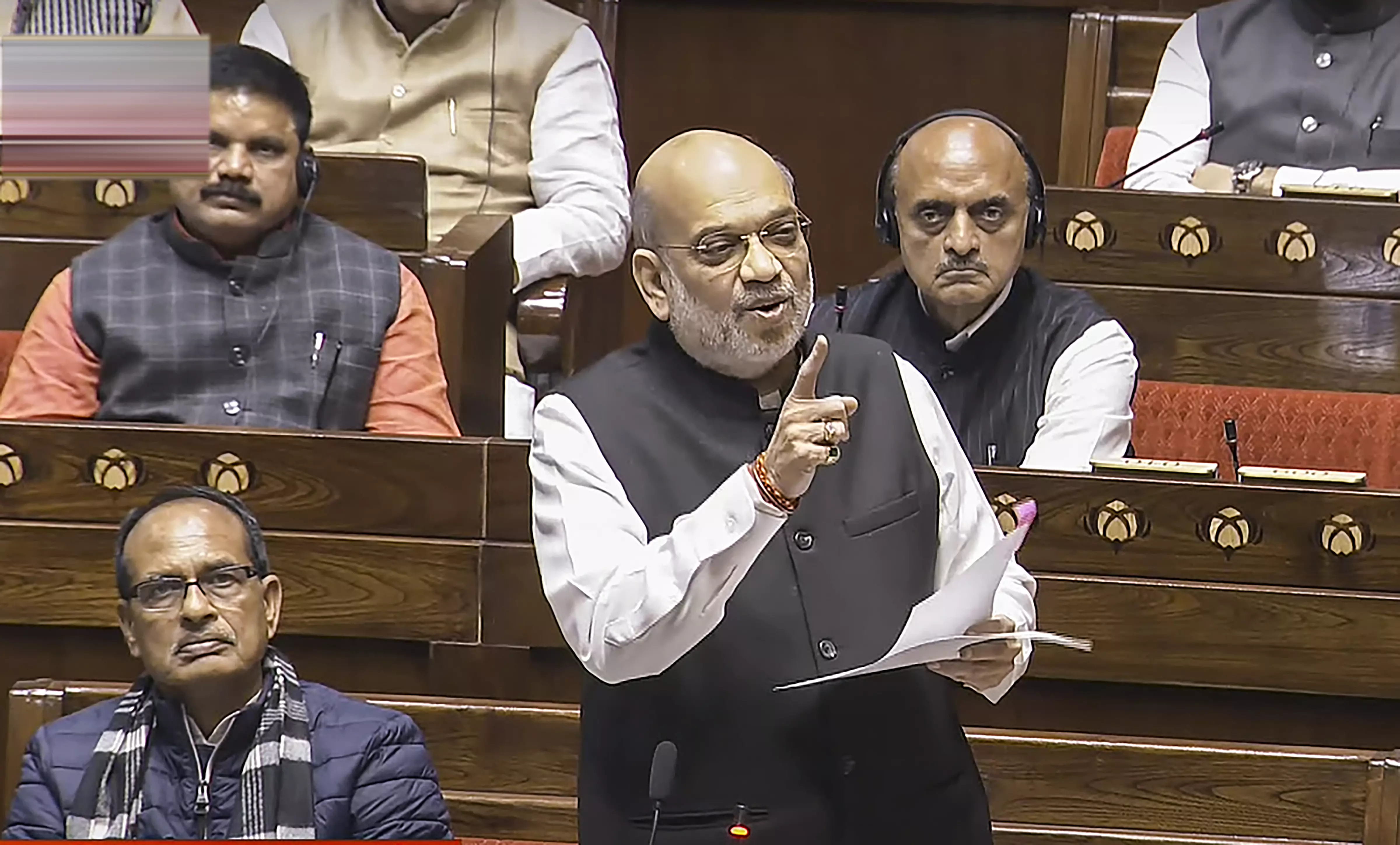
Parliament LIVE | Will bring Uniform Civil Code in every state: Amit Shah
Slamming the Congress, the Home Minister said successive Congress regimes did not prioritise the progress of OBCs

The Congress on Tuesday (December 17) claimed the Bill on holding simultaneous polls was against federalism and "anti-constitutional", and said the voting at its introduction stage in Lok Sabha showed the BJP lacks the two-thirds majority required to pass a constitutional amendment.
Two Bills that lay down the mechanism to hold simultaneous elections were introduced in the Lok Sabha after a fiery debate on Tuesday.
Opposition parties dubbed the draft laws -- a Constitution amendment bill and an ordinary bill -- as an attack on the federal structure, a charge rejected by the government.
Also read: 'One Nation One Election' Bill likely to be tabled in Lok Sabha today
Speaking to reporters on Parliament premises, Congress MP Priyanka Gandhi Vadra said, "Anti-constitutional bill, it is against the federalism of our nation. We are opposing the bill."
Congress MP Shashi Tharoor also hit out at the government, saying voting at the introduction stage showed the BJP did not have the two-thirds majority required to pass a constitutional amendment.
"We (the Congress) are not the only ones that have opposed this bill. The vast majority of the opposition parties have opposed this bill and the grounds are very many, it is a violation of the federal structure of the Constitution. Why should a state government fall if the central government falls?" he told reporters on the premises.
Tharoor said the government might constitute Parliament's joint committee in such a way that it has a majority, but without a two-thirds majority in the House there would not be a constitutional amendment. "So this discussion is increasingly futile," he added.
Opposition terms move 'dictatorial'
The Opposition termed the move “dictatorial” even as Union Law Minister Arjun Ram Meghwal asserted that the legislation would not tamper with the powers enjoyed by states.
The Constitution (129th Amendment) Bill was introduced in the Lok Sabha by Meghwal after a nearly 90-minute debate, followed by a division of votes. As many as 269 members voted in favour of the Bill and 198 against it.
Meghwal also introduced The Union Territories Amendment Bill, which seeks to align elections in the Union territories of Puducherry, Delhi, and Jammu and Kashmir with the Lok Sabha polls. He said the proposed bills did not attack the "basic structure doctrine, as claimed by the Opposition". He said he would move a resolution referring the Bills to a joint committee of Parliament.
Also read: BJP’s obsession with One Nation, One Election: Implications for democracy
Congress MP Manish Tewari opposed the introduction of the Bills and termed the move an assault on the basic structure doctrine that stipulates certain features of the Constitution are beyond the amending power of Parliament.
Samajwadi Party MP Dharmendra Yadav said the measure to introduce "one nation, one election" by the BJP was an attempt to bring dictatorship in the country.
TMC MP Kalyan Banerjee said the Bills linked the tenure of state assemblies to that of the Lok Sabha, thus undermining the mandate of the people.
DMK member TR Baalu said, "The electors have the right to elect the government for five years and this right cannot be curtailed with simultaneous elections."
Meanwhile, BJP allies TDP (TDP) and Shiv Sena (Shinde) extended "unwavering support" to the election reform measure.
TDP member and Union minister Chandra Shekhar Pemmasani said "One Nation, One Election" would reduce expenditure on polls and enhance logistical efficiency.
Shiv Sena member Shrikant Shinde hit out at the Opposition, saying they were allergic to reforms.
Follow the live updates here
Live Updates
- 17 Dec 2024 5:00 PM IST
'One nation one poll' will galvanise election process, lead to economic growth: Kovind
Once the 'One nation one poll' proposal by the Centre becomes functional, it will galvanise the election process and will also help in the economic growth of the country, former President Ram Nath Kovind said here on Tuesday.
Kovind was the chairman of the high-level committee on simultaneous elections, which was constituted by the Government of India in September 2023.
Speaking at a programme of a tribal organisation in Kolkata, Kovind said voters are tired of meeting candidates of political parties seeking votes every year and probably don't want to face them so frequently.
"Once the proposal becomes fully functional in 2029-2030, or say at a later date, as it might take 5-10 years to have simultaneous polls, voters won't have to head to polling stations every year for one poll or another. This will also lead to economic growth as the GDP growth of the country will rise by 1.5 per cent from 7.23 per cent at present," he said.
"Think about that if 1.5 points are added to the existing GDP it won't take long to reach the 10 per cent (GDP) figure. Then our country will be among the top 3-4 economic superpowers in the world," he said.
Kovind claimed that the one nation one poll will galvanise the election process.
"If candidates have to ask for votes from people every year, they will have to reply why this development promise has not been implemented. Yearly elections make people averse to going to booths at times," he said.
He said the 18,000-page report of the committee is in public domain and will streamline economic governance.

